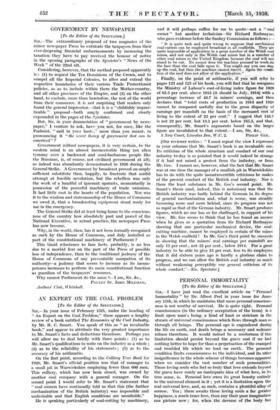GOVERNMENT BY NEWSPAPER
[To the Editor of the SPECTATOR.]
SIR,—The extraordinary proposal of two magnates of the minor newspaper Press to extricate the taxpayers from their ever-deepening financial embarrassments by increasing the taxation they have to pay received the honour of notice in the opening paragraphi- of the Spectator's "News of the Week " of the -22nd ult.
Considering, hOmiever, that the method proposed apparently is i (1) to request the Ten Dominions of the Crown, and to compel all the Iniperial Colonies, to alter and extend the respective boundaries of their various Trade Protectionist policies, so as to include within them the Mother-country, and all Other provinces of the Empire, and (2) on the other hand, to exclude, more than heretofore, the rest of the world from their commerce, it is not surprising that readers only found the general impression—that it is a "childishly imprac- ticable " propOsal—both amFly confirmed and clearly expounded in the pages of the Spectator.
But, Sir, in your denunciation of " government by news- paper," I venture to ask, have you not,, for once,_ like the Psalmist, " said in your haste," more than you meant, in pronouncing it " the worst theory of government that can be conceived" ?
Government without newspapers, it is very certain, to the modern mind is an almost inconceivable thing (an alien tyranny- over a backward and semi-barbarous people like the Russians, is, of course, not civilized government at all), as indeed was abundantly demonstrated in 1926 during the General Strike. A Government by broadcast proved an amply sufficient substitute then, happily, to frustrate that sordid attempt at forcible revolution, but the rebellion was only the work of a handful of ignorant upstarts, momentarily in possession of the powerful machinery of trade unionism. It. had little root in the hearts of the population. Nor. was it to the wisdom and statesmanship of the House of Commons we owed it, that a broadcasting equipment stood ready for use in the emergency.
The General Strike did at least bring home to the conscious- ness of the country how absolutely part and parcel of the National Executive, in actual practice, the newspaper Press has now become.
Why, in the world, then, has it not been formally recognised as such by the House of Commons, and duly *stalled as part of the constitutional machinery of Parliament ?
This timid reluctance to face facts, probably, is no. less due to a morbid fear on the part of the Press of Possible loss of independence, than to the traditional jealousy of the House of Commons of any preventable usurpation of its authority—a jealousy that seems to increase as its incom- petence increases to perform its main constitutional function as guardian of the taxpayers' resources.




















































 Previous page
Previous page